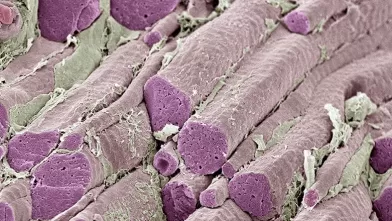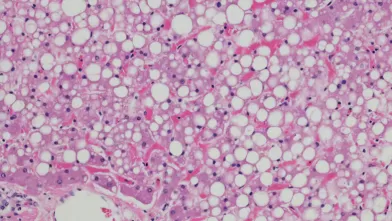Disease Education Information
Hypertriglyceridemia is a common condition characterized by high levels of triglycerides, a type of fat, in the bloodstream.1 Individuals with severe hypertriglyceridemia (SHTG) have triglyceride levels more than three times the normal level.2 SHTG can lead to multiple serious conditions, including cardiovascular disease (CVD) and acute pancreatitis.1 Pfizer aims to help address SHTG through the development of novel medicines aimed at lowering levels of triglycerides to minimize the impact of this serious condition.
View more information about our pipeline below.
- Read SHTG-related feature stories
- Learn SHTG basics
- See more information about our pipeline and Pfizer clinical trials
- What is Severe Hypertriglyceridemia?
Hypertriglyceridemia is a common condition, which is defined as having a high level (above 150 mg/dL) of triglycerides, a type of fat, in the bloodstream.1 Hypertriglyceridemia can lead to conditions including atherosclerosis (hardening of the arteries), obesity, and insulin resistance, which all can contribute to increased risk of cardiovascular disease (CVD).1,3 There are more than 2.1 million adults in the United States with severe hypertriglyceridemia (SHTG),4 which is defined as having a triglyceride level over 500 mg/dL.2 In addition to increasing the risk of CVD, SHTG is also a known risk factor for acute pancreatitis, a life-threatening condition.5,6
- Who Gets Severe Hypertriglyceridemia and How?
Risk factors for SHTG can include genetic disorders, obesity, untreated diabetes, and certain medications.7
- What are the Symptoms of Severe Hypertriglyceridemia?
While SHTG often causes no noticeable symptoms, individuals with extremely high levels of triglycerides (greater than 2,000 mg/dL) can experience recurrent abdominal pain, nausea, vomiting, xanthomas (yellow-colored bumps on the skin), and acute pancreatitis.1,4
- How is Severe Hypertriglyceridemia Diagnosed?
SHTG is typically diagnosed after a routine blood test called a lipid profile.1 The National Cholesterol Education Program recommends that everyone have a lipid profile done every five years beginning at the age of 20.1 However, for people with or at risk for coronary heart disease, it’s recommended to have a lipid profile done yearly.1
- Can Severe Hypertriglyceridemia Be Prevented or Treated?
There are many ways to prevent and treat SHTG. Lifestyle changes that can impact SHTG include lowering fat and carbohydrate intake, reducing alcohol consumption, and quitting smoking.1 For some people, lifestyle changes aren’t enough to reduce triglycerides to the appropriate levels, leaving them at risk for additional complications.1 In these cases, there are pharmacological therapies that can reduce triglyceride levels to healthier levels.1
The goal of medical treatment for SHTG is to reduce triglyceride levels in order to reduce the risk of CVD and acute pancreatitis.5 Statins can be used to reduce triglycerides, but nearly one-third of people taking this type of treatment still have high triglyceride levels.4 Pfizer scientists aim to address SHTG by developing new therapeutic approaches that can improve reduction of triglycerides in the bloodstream to help further minimize the impact of this serious condition.
SHTG Resources
Area of Focus: Internal Medicine
Severe Hypertriglyceridemia is a focus of our Internal Medicine Therapeutic Area.
Visit Our Internal Medicine Site DetailsClinical Trials
We proudly partner with thousands of study sites and tens of thousands of trial participants around the world. It's these clinical trials that lead to life-changing medicines.
Go to Pfizer Clinical Trials Site DetailsReferences
1 Pejic RN and Lee DT. Hypertriglyceridemia. The Journal of the American Board of Family Medicine. May 2006, 19 (3) 310-316; doi: https://doi.org/10.3122/jabfm.19.3.310.
2 American College of Cardiology. Hypertriglyceridemia Management According to the 2018 AHA/ACC Guideline. https://www.acc.org/latest-in-cardiology/articles/2019/01/11/07/39/hypertriglyceridemia-management-according-to-the-2018-aha-acc-guideline. Published Jan. 11, 2019. Accessed October 14, 2020.
3 Nordestgaard BG and Varbo A. Triglycerides and cardiovascular disease. The Lancet. August 2014, 384(9943) 626-635; doi: https://doi.org/10.1016/S0140-6736(14)61177-6
4 Fan, Wenjun et al. “Hypertriglyceridemia in Statin-Treated US Adults: The National Health and Nutrition Examination Survey” Journal of Clinical Lipidology (2019) 13, 100–108.
5 Laufs, Ulrich et al. “Clinical review on triglycerides.” European Heart Journal, January 2020, 41(1): 99–109c; https://doi.org/10.1093/eurheartj/ehz785
6 Wang, Guo-Jun et al. “Acute pancreatitis: etiology and common pathogenesis.” World journal of gastroenterology vol. 15,12 (2009): 1427-30. doi:10.3748/wjg.15.1427
7 Ewald, Nils, and Hans-Ulrich Kloer. “Treatment options for severe hypertriglyceridemia (SHTG): the role of apheresis.” Clinical research in cardiology supplements vol. 7,Suppl 1 (2012): 31-5. doi:10.1007/s11789-012-0042-x











